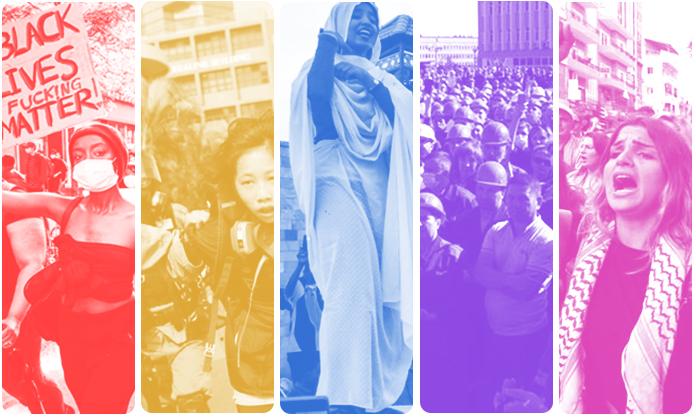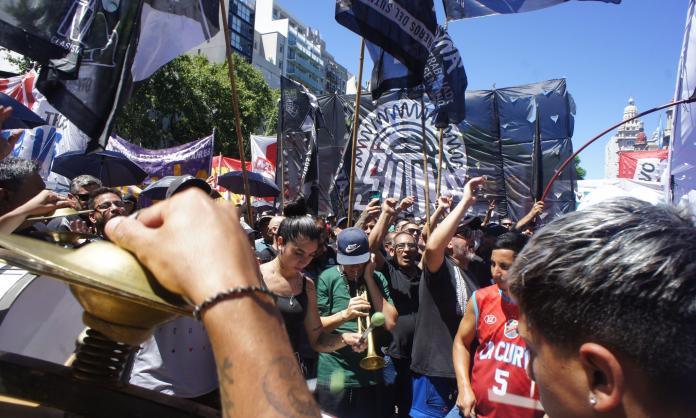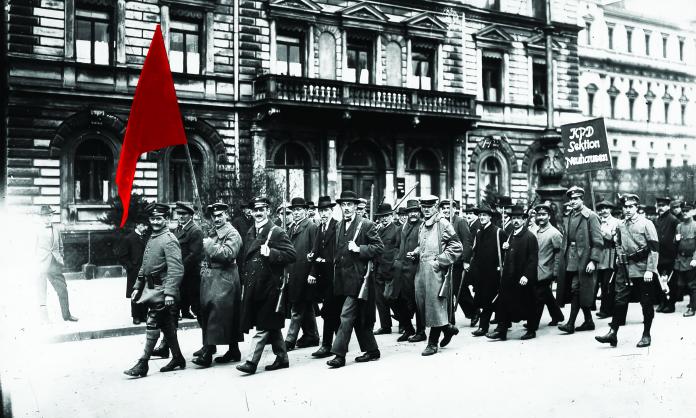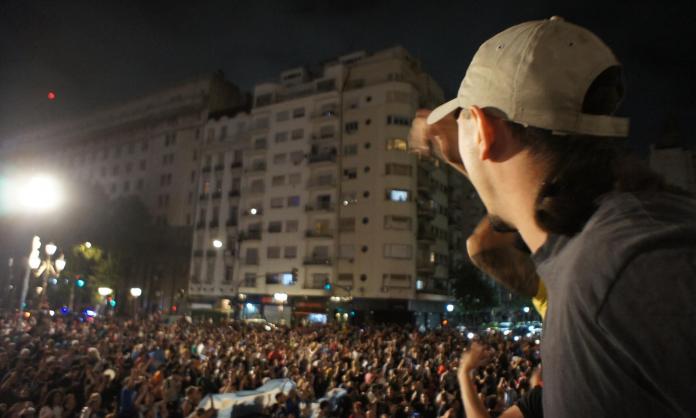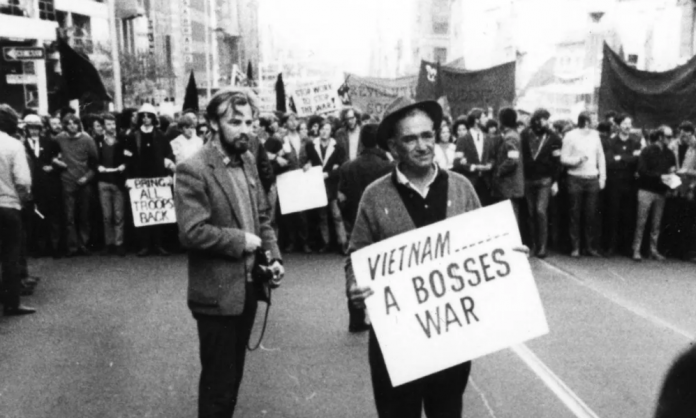Would Karl Marx have supported the striking workers of Belarus? Would Lenin have cheered on Hong Kong’s uprising against the Communist Party of China? If Palestinians have the right to resist the violent obliteration of their national identity, what about the Uighurs of Xinjiang?
It was, perhaps, a little simpler for Western leftists to offer solidarity to the uprisings of the oppressed in the 1990s and 2000s, when the US empire seemed to have achieved permanent global hegemony. Back then, it was common sense for the left that the Palestinians and Iraqis had the absolute right to resist their Israeli and US oppressors, and that any defeat inflicted on Western imperialism was a victory for humanity. Conservatives accused the left of sympathising with “Islamo-fascism”, but if you knew that you were on the side of the oppressed against the oppressor, it was clear where you had to take your stand.
Two recent international uprisings have made the picture more complicated, at least for some. The first was the epoch-defining wave of Arab revolutions that unfolded from 2011. The second is the seemingly unending series of international rebellions that began in 2019 and carries on to this day.
The first wave of Arab revolutions took place throughout the Middle East, against both secular and religious dictatorships, some aligned with the US (like Egypt’s Hosni Mubarak) and others with Russia (like Syria's Ba’athist regime of Bashar al-Assad). All the uprisings were based on mass participation and democratic aspirations. They identified with, and took inspiration from, one another as a united wave of movements. Most of the ruling powers they targeted, whether aligned with the US or its rivals, adopted similar strategies to defeat them, resembling George W. Bush’s earlier attempts to subjugate Iraq: slandering all resistance as a conspiracy of al-Qaeda sympathisers and foreign intelligence, to justify brutal repression.
Explaining his murder of protesters, which would ultimately escalate into carpet bombing reminiscent of the US war against Vietnam, Bashar al-Assad sought the sympathy of Barbara Walters’ American audience by explaining that all states have to repress protesters who challenge the system, whether Arabs in Syria or Black people in the US: “You don’t allow in the United States to have militants—and remember what happened in Los Angeles in the '90s, when you send the army to the city, to face the terrorists”. Four years later, in 2015, Assad’s military backer, Russian President Vladimir Putin, delivered to the UN a speech that could have been written by George W. Bush. He boasted about “consistently fighting against terrorism in all its forms” by providing “military and technical assistance to both Iraq and Syria” and building an “international coalition against terrorism” reminiscent of the anti-German alliance in World War Two.
The Arab revolutions were defeated as cash and weaponry flowed in to stabilise the dictatorships—Saudi bailouts helped re-establish military rule in Egypt; Russian air power wiped out the democratic uprising in Syria and ground it down to a brutal, prolonged war of attrition. But incredibly, mass politics returned in 2019. Once again, it began in the Arab world—this time led by Sudan and Algeria—but it has swiftly spread to Asia, the Americas and Europe. We are living through one of the world’s great waves of global struggle. The wave seems to be gaining strength, this year reaching even the US itself.
Like the Iraqi resistance to the US invasion, or contemporary Palestinian resistance to Zionist occupation, these uprisings aren’t carried out under the red banners of socialist political leadership. Their enemies are nationalist governments ruling over capitalist economies, but their demands are mostly democratic: the right to vote and have votes counted, self-determination for national and religious minorities, cleansing of corrupt political establishments that have presided over poverty and a degradation of social life.
And again, governments are resorting to similar tactics to smear the movements and, if necessary, lay the basis to repress them violently. Just as Trump’s defenders present Black Lives Matter as a conspiracy of anarchist antifa agents, the Democratic apparatus and George Soros, so do Belarusian President Lukashenko and the Chinese government present mass uprisings as conspiracies of foreign powers, “colour revolutions” led by NATO or the CIA or, again, George Soros.
Some draw the logical conclusion and achieve total consistency: Maram Susli, a popular online defender of Bashar al-Assad, applied the same techniques she had used to slander the Syrian revolution to determine that “Black Lives Matter is a colour revolution”—an establishment plot to take down Donald Trump, just like the Syrian revolution was supposedly not a genuine popular uprising, but a conspiracy to undermine the blameless Assad.
Indeed, all the arguments deployed to smear the uprisings in places such as Syria, Hong Kong and Belarus apply to the movement for Black lives in the US, as pointed out by the anarchist blogger R. Totale in “Hands off the US!”
Movement participants have pioneered innovative DIY methods to defend themselves against the police: umbrellas against tear gas; brick constructions to disable armoured cars; even elaborate siege weapons. Some have heroically fought police, embracing combat and showing incredible physical courage amid a general focus on mass peaceful protest. The uprisings were praised by capitalist politicians, who hoped to gain the prestige of a mass movement—Joe Biden even invited George Floyd’s family to speak at the opening of the Democratic convention. None of this means that Black Lives Matter, or any of the other movements, are conspiracies in the service of imperialism.
Such conspiracy-mongering was perhaps a bit more understandable when Stalinism was a living doctrine: decades ago, state powers claimed to represent “actually existing socialism” while they gunned down working class uprisings like the Hungarian revolution of 1956. Their foreign defenders had to convince themselves military attacks on striking workers and destruction of revolutionary workers’ councils were justifiable self-defence against neo-Nazi terrorists backed by Western intelligence. But few repressive states now even pretend to be socialist, or transitioning towards socialism. The governments of Belarus and China are no more likely to transcend capitalism than either the Iranian ayatollahs or Joe Biden’s Democrats.
But even without the idea that mass uprisings are a threat to some kind of bureaucratic “socialism”, conspiracy-minded suspicion of mass revolt still appeals to some. It finds an audience in people who oppose US imperialism, but who can’t conceive of any way to combat it except by supporting rival capitalist states: theocratic states like Iran, quasi-fascist dictatorships like Ba’athist Syria, post-Stalinist oligarchies like Russia, Singapore-inspired market dictatorships like contemporary China.
Some defenders of these regimes call themselves “Marxist-Leninists”. But the anti-imperialism of Lenin’s Communist International was a principle that prevented an international, revolutionary working-class movement from subordinating itself to any particular capitalist state’s national interests. This contemporary so-called anti-imperialism is the exact opposite. Without belief in the capacity of the working class to smash the state and destroy capitalism, “anti-imperialism” isn’t anti-imperialist: it’s just advocacy for a different selection of capitalist states.
“Anti-imperialists” such as Maram Susli, the writers for the scurrilous counter-revolutionary blog the Grayzone and certain degraded “Marxist-Leninists” don’t have a political outlook that extends beyond advocating for, and defending, the US’ main rivals—hoping to achieve a “multipolar world” by strengthening capitalist states that are competing with the most powerful empire. But this means they end up not only supporting the repressive neoliberalism of right-wing capitalist governments, but also defending outright imperialism of the most brutal kind: Russia’s carpet bombing of Syria justified, like the US invasion of Vietnam, on the grounds of fending off foreign interference and domestic extremism; China’s subjugation of national minorities in Xinjiang and Mongolia.
Of course, Western intelligence and its military apparatus do overthrow governments through conspiracies masquerading as democratic transitions. The farcical attempt to install Juan Guaidó in Venezuela, or the more successful fascistic coup in Bolivia, are recent examples. Considering these examples proves how easy it is to distinguish a genuine popular uprising from a right-wing plot. The cops and security apparatus carried out the groundwork of the Bolivian coup, and are currently defending their authoritarian government from popular resistance; the cops in Belarus are the strongest bulwark of support for the reactionary government against the working-class democratic movement trying to overthrow it.
In fact, we might ask: would a modern “anti-imperialist” have supported the Russian revolution?
Consider the situation in the middle of 1917. A new government, led by the well-known socialist Kerensky, had been installed by a workers’ revolution only a few months earlier. Other socialists, from parties that had recently been forced to operate underground, had taken up ministerial positions. The government had the strong backing of workers’ soviets, revolutionary bodies built from the bottom up by working-class activists. On civil liberties, it was well known that Russia was the “freest country in the world” since its revolution in February. The new government had promised sweeping reforms on a range of questions, including a new constitution. This all compares pretty favourably to politically stagnant and repressive market economies like China, Syria or contemporary Russia.
And Kerensky’s Russia was menaced by internal and external oppositions in the most extreme form: monarchist generals were openly planning coups, and the Kaiser’s Germany had been attempting to invade for three years of open warfare.
Into this volatile situation comes Lenin—with the assistance of German imperialism, which arranged his travel from exile into Russia. Did he, displaying the principles of a modern “anti-imperialist”, call for critical support for the new Russian government in its military struggle against German invasion? No: he and his Bolshevik Party called for workers to intensify their strikes, demonstrations and political attacks on the government, to build up to a second revolution in which workers would seize power–and defeat world imperialism by overthrowing capitalism.
Defenders of Kerensky’s government issued an appeal for support, warning that the Bolsheviks were “calling upon you to demonstrate in favour of the revolution, but we know that hidden counter-revolutionaries want to make use of your demonstration ... We know that counter-revolutionaries eagerly await the moment when internecine war in the ranks of revolutionary democratic forces will make it possible for them to crush the revolution”.
But rather than uniting with their “revolutionary” government, with its “socialist” ministers, the Bolsheviks continued organising for a workers’ revolution—and that’s how we know that it is possible to chart an independent revolutionary course, through struggles for democracy and peace, towards workers’ power.
As Lenin argued in The State and Revolution, recovering Marx’s revolutionary theory from “Marxists” who had abandoned workers’ revolution, no capitalist state can lead a fight for human liberation—regardless of the colour of its flag, the party affiliation of its president or the geopolitical power bloc with which it’s aligned. Only the global working class, breaking through national boundaries in a worldwide revolutionary movement, can defeat imperialism by overthrowing the capitalist system that sustains it.
And a global workers’ revolution doesn’t emerge overnight. It develops from the convergence and growth of thousands of struggles, as did the Russian Revolution: for the right to vote, for land to be redistributed, for peace. The students of Hong Kong, and workers of Belarus who strike and protest for their right to vote, inherit the legacy of the Russian workers whose strikes for democracy at the dawn of the 20th century convinced Lenin that a workers’ revolution was on the way.
If democratic movements are scorned by Marxists, they will find other worldviews—and, unable to challenge capitalism, never really achieve their goals. In fact, it’s only revolutionary Marxism that can explain how movements from Hong Kong to Portland are struggling against a single global system. Marxism must again become the theory and practice of global revolution.
Marx rejected comprehensively a reliance on national states to liberate humanity, and replaced it with working-class internationalism: “Workers of the world, unite” remains the Marxist strategy for socialism. That began with Marx and Engels’ support of workers’ riots and strikes, in a time when traditional socialists saw things like that as bringing nothing but chaos. It continued in their fight for an internationalist workers’ movement that would support democratic struggles while fighting for independent, revolutionary working-class politics. In a period of both heightened imperialist tensions and explosive global rebellion, the Marxist strategy remains irreplaceable.
Some of today's movements have already shown their power to inspire not only protests, but workers' strikes aimed at transforming society. If any of these were able to develop into a workers' uprising that could challenge the capitalist state for power, it would provide an example to a world struggling to find a path out of a global crisis. It would do more for the prospects of socialism overnight than a thousand year reign of any existing power.
The activists leading today’s struggles have a sense of authentic, internationalist anti-imperialism that puts many Western “anti-imperialists” to shame. The Lebanese movement of 2019, with the creativity characteristic of mass uprisings, contributed to history a beautiful song-chant that captures the world view of revolutionary solidarity that must power the struggle for socialism. It’s called “Thawrah bi kullil buldaan” (Revolution in all countries):
From Lebanon to Hong Kong, we want to sing this song:
Revolution in all countries,
Revolution in all countries.
From Lebanon to Iran, the people are tired and impoverished;
Our revolution is against the banks, and the government fears the people;
From Lebanon to Iraq, one revolution against thieves;
Our demands are simple: justice, bread, and freedom;
From Lebanon to Saudi Arabia, abolish reactionary politics and the guardians of sectarianism;
From Lebanon to Algeria, we want to overthrow the regime;
From Lebanon to Sudan, we have the right to live in safety;
From Chile to Lebanon, the people are the power;
Egypt and Lebanon are against Sisi and the police state;
We don't forget Yemen's pain, one revolution against hunger;
Bahrain, we will not let your voice be sidelined;
Syrian people, we have not forgotten you, God help you against the regime;
Palestine, our beloved, your freedom is our goal,
Down, down with Israel!
Down, down with Israel!




